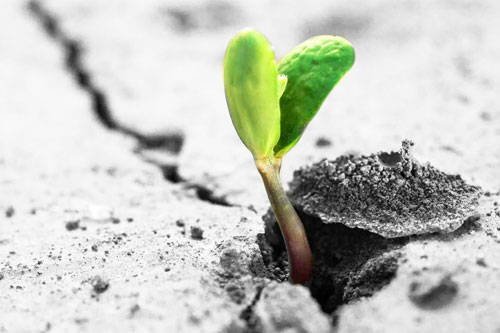I’ve been working in behavioral health for about 30 years. I’ve worked in all kinds of settings—inpatient, outpatient, prisons, university counseling centers, and as a professor of counseling and psychology. I’ve seen thousands of people over the years but there are always those that I remember.
She came into my office hesitantly. She held on to the door frame, then shuffled towards the chair and grabbed it for support before sitting heavily. She looked worn-out, exhausted even, from the trek to the chair. Her skin was ashen and dry, cheeks sunken, with dark bags under her eyes. Even though it was a warm day she was dressed in layers to deal with the air conditioning inside. She was wearing a pink kerchief but I knew that her hair had fallen out after all the rounds of chemo she had been through.
She was breathing heavily. I gave her a moment to catch her breath then asked her how she was doing.
“Today is a growing day,” she responded with a tired smile.
“A ‘growing day’?” I asked.
“I have good days and I have days where I get to learn just how much I can handle. Those aren’t bad days because I can still get something out of it. I have to grow. That’s why today is a growing day.”
She was 54 and had terminal cancer. She passed away a couple of months later. She had a lot of growing days before the end. She chose to grow. She had been sober for close to 20 years and knew how easy it would be make the pain go away. Instead, she wanted to show her children life is always worth living. That meaning can be found despite suffering.
She was the very embodiment of Viktor Frankl’s philosophy, “We must never forget that we may also find meaning in life even when confronted with a hopeless situation, when facing a fate that cannot be changed. For what then matters is to bear witness to the uniquely human potential at its best, which is to transform a personal tragedy into triumph, to turn one’s predicament into a human achievement. When we are no longer able to change a situation–just think of an incurable disease such as inoperable cancer–we are challenged to change ourselves.” (Man’s search for meaning, Viktor Frankl, pp. 111).
We often avoid pain and will use the unhealthiest ways to do so. We will wait until the pain becomes utterly unbearable. Yet we fear the possibility of the pain of recovery and will continue to do the very things that cause pain. We hit rock bottom. But what if we thought of “rock bottom” not as the end of the journey but as the foundation of a new life? Recovery is growth towards your full potential.
Make today a growing day.









